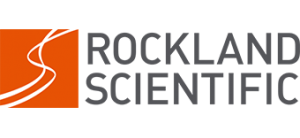Visitor’s Info Package for VicTOR 2016 Released
Only 2 weeks until VicTOR 2016!
Please find all the information in our VicTOR 2016 Information Package.
Only 2 weeks until VicTOR 2016!
Please find all the information in our VicTOR 2016 Information Package.
VicTOR 2016 builds on success of previous turbulence training workshops held around the world
The Victoria Turbulence Observation Retreat, “VicTOR 2016”, is a 5-day VMP training workshop that covers all aspects turbulence measurements using VMP profilers, from basic measurement theory, to the setup, operation, maintenance, deployment and processing of VMP turbulence data. The workshop is scheduled for October 17-21, 2016 in Victoria. Please see the VicTOR 2016 Syllabus for details. Seven spots remain at time of this publishing.
VICTORIA, CANADA, April 18, 2016 – Rockland Scientific Inc. (Rockland), Teledyne Webb Research (TWR) and their Spanish partner, INNOVA oceanografía litoral, are pleased to announce the inaugural Ocean Microstructure Glider Training Program (OMG 2016), scheduled for May 10 – 13th, 2016 at the “Marine Technological Service” (SITMA) within the University of Las Palmas de Gran Canaria.
The training course is concentrated on acquisition and analysis of microstructure turbulence measurements from the Slocum Ocean Microstructure Glider. This unique collaboration of Rockland Turbulence Scientists and TWR Glider Pilot Instructors results in a comprehensive Ocean Microstructure Glider programme spanning 3.5 days, with one day of this time dedicated to field measurements off the coast of Gran Canaria.
To ensure a limited number of trainees per instructor, spaces will be provided on a first-come, first-serve basis. Please visit the news section of the Rockland, TWR or INNOVA for the course syllabus and contact info@rocklandscientific.com for more information and registration details.
About Rockland Scientific
Rockland, located in Victoria, Canada, provides sensors and instrument systems for ocean turbulence measurements. The instruments are either ship-deployed profilers, moored systems, or deployed from autonomous gliders, floats, or AUVs. Rockland measurement systems are used worldwide in a multitude of disciplines, such as Climate Research, Renewable Ocean Energy, Coastal Management and Erosion Studies, and Fisheries Research.
About Teledyne Webb Research
TWR is a world leader in the design and manufacture of scientific instruments for oceanographic research and monitoring. Teledyne Webb Research specialises in three areas of ocean instrumentation: neutrally buoyant, autonomous drifters and profilers; autonomous underwater gliding vehicles; and moored underwater sound sources.
About INNOVA oceanografía litoral
INNOVA, founded in 1997 and headquartered in Barcelona, Spain, specializes in oceanographic services and supplies instrumentation for the measurement of ocean dynamics. INNOVA leverages its strong relationships with vendors such as Rockland and TWR to promote and organizes training seminars and courses, providing end-users in the Southern European with opportunities for hands-on exposure to the latest ocean technologies
Please see the OMG 2016 Training Overview for course outline and learning goals.
The need for improved knowledge of turbulence statistics in tidal energy generation has led to a trans-Canadian collaboration between British Columbia-based Rockland Scientific International and the Ocean Acoustics Laboratory (OAL) at Nova Scotia’s Dalhousie University to develop advanced techniques for turbulence measurements at turbine ‘hub height’.These new techniques will be traceable to a laboratory standard for turbulence measurement. Read More >>>
Nova Scotia is advancing its leadership position in the tidal industry with two new international research grants.
The two projects, worth $1.43 million, will help governments, industry and researchers better understand the effect tidal technology has on the marine environment, and the impact of the marine environment on that technology.
This is the first announcement under the memorandum of understanding signed between the government, Offshore Energy Research Association and the United Kingdom.
“Canada and the United Kingdom are recognized leaders in marine renewable energy, and ongoing investments in tidal research spur innovation and development in both countries,” said Energy Minister Michel Samson. “These projects are an example of how partners from around the world are coming together to better understand the opportunity in our oceans and how to harness their power – safely, effectively, and in an environmentally responsible way.”
The projects have been selected for funding through a partnership between the Offshore Energy Research Association, a Nova Scotia based not-for-profit research group, and Innovate UK, a government-funded business and innovation organization.
“Collaboration is a critical element in fostering the growth and development of a global tidal energy industry,” said Stephen Dempsey, executive director, Offshore Energy Research Association. “The efforts of Innovate UK and the association in supporting these two important research projects will not only have lasting commercial benefits, but will also make important contributions in technical know-how, helping build this industry on both sides of the Atlantic.”
The first project is led by British Columbia-based Rockland Scientific, in partnership with Dalhousie University and Black Rock Tidal Power, along with United Kingdom-based FloWave TT, European Marine Energy Centre, and Ocean Array Systems.
Research partners will develop new sensor systems to measure turbulence, which allows developers to design and deploy technology that performs better in strong tides and currents.
The research will be carried out in both Canadian and United Kingdom waters, including at the Fundy Ocean Research Center for Energy in the Bay of Fundy. Testing will also be conducted at the University of Edinburgh’s FloWave Ocean Energy Research Facility and at the European Marine Energy Centre in Scotland’s Orkney Islands.
This is the first EUREKA-designated research project carried out in Nova Scotia.
“Innovate UK is pleased to be working alongside Offshore Energy Research Association on this effort, as it sees Nova Scotia as a growing and large potential market for tidal energy, making this a good opportunity for United Kingdom companies to gain exposure to that market,” said Rob Saunders, head of energy, Innovate UK. “We believe that faster progress will be made by combining the expertise, knowledge and experience to tackle common problems.”
The second project is led by Nova Scotia-based Emera Inc. in partnership with OpenHydro Canada, Ocean Sonics, and Acadia University, along with United Kingdom-based Tritech, Sea Mammal Research Unit’s United Kingdom and Sea Mammal Research Unit Consulting Canada. This project will improve the tracking of fish and marine mammals in the Bay of Fundy.
The system will be used at the Cape Sharp Tidal berth at the Fundy Ocean Research Center for Energy, gathering information to assess the impact of its turbine on marine life.
Offshore Energy Research Association’s investment of $500,000 represents Nova Scotia’s contribution to these projects.
Innovate UK is contributing $331,000, with remaining funding being provided by federal government agencies and private industry in both Canada and the United Kingdom.
More information is available at www.oera.ca
Rockland is hosting a hands-on demonstration of the VMP-250 microstructure turbulence profiler as part of Ocean Business 2015, NOC Southampton. This course is free to attend, but registration is required on the Ocean Business 2015 website.
The demonstration will be in two parts: a 1-hour field demonstration and a 1-hour classroom session. 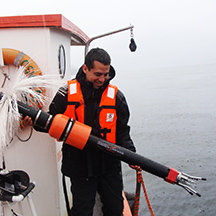
Wednesday, April 15, 1:30 – 2:30 PM: Field demonstration with the VMP-250 in Southampton waters aboard the R/V Bill Conway.
Thursday, April 16, 9:00 AM – 10:00 AM: Step-by-step processing analysis of microstructure turbulence data collected during the field demo.
Space is limited to 10 participants. To reserve your spot now, contact Jeremy @ rocklandscientific.com
FloWave and Rockland Scientific join forces to improve understanding of tidal turbulence
Agreement paves way for broader collaboration on measuring turbulence ‘from the lab to the ocean’
(Official News Release – 02 June 2015)
Two of the leading organisations in ocean energy research have pledged to work together to measure and understand the impact of turbulence on wave and tidal energy devices.
FloWave Ocean Energy Research Facility at Edinburgh University and Canadian marine turbulence specialists Rockland Scientific will work together to develop tank-scale turbulence measurement technology, which can also be deployed at sea, on both sides of the Atlantic.
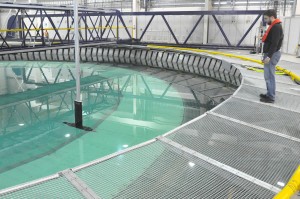 The two firms – which already completed a first round of technology testing in 2014 – announced the collaboration agreement at FloWave today [Tuesday June 2] during an ocean energy trade mission from Nova Scotia organised by Scottish Development International, the international arm of Scottish Enterprise and the Nova Scotia Department of Energy.
The two firms – which already completed a first round of technology testing in 2014 – announced the collaboration agreement at FloWave today [Tuesday June 2] during an ocean energy trade mission from Nova Scotia organised by Scottish Development International, the international arm of Scottish Enterprise and the Nova Scotia Department of Energy.
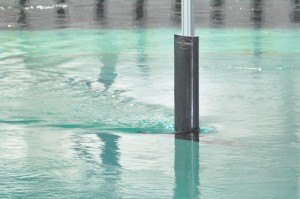 The mission brings together developers, supply chain companies and R&D organisations from Scotland and Canada, with the aim of encouraging and supporting closer trans-Atlantic collaboration on marine renewable energy technologies and projects.
The mission brings together developers, supply chain companies and R&D organisations from Scotland and Canada, with the aim of encouraging and supporting closer trans-Atlantic collaboration on marine renewable energy technologies and projects.
“The accurate measurement and understanding turbulence, and particularly its impact on structures and performance, is a vital part of designing and deploying any wave or tidal technology”, says FloWave Chief Executive Officer Stuart Brown.
“To date, the techniques for measuring turbulence in the laboratory have been very different to those adopted at sea, making like-for-like comparisons from one environment to the other more difficult. At FloWave we have already completed valuable turbulence characterisation work with Rockland Scientific – specifically bringing their ocean-going instrument into the laboratory at FloWave back in 2014.
“This new agreement allows the partners to build on that pioneering work to deliver transferable turbulence measurement solutions that enable all parties to dramatically improve their understanding of turbulence in fast tidal currents. That this translates across the scales from test tank model scale to full scale installations in the real environment directly addresses industry challenges such as device design for performance and reliability, accurate energy yield prediction for individual devices and the optimization of array project layouts; all of which are key parameters for the technical and 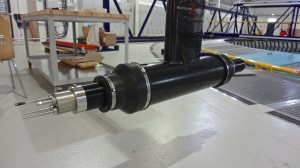 commercial feasibility of tidal energy conversion projects,” Brown concludes
commercial feasibility of tidal energy conversion projects,” Brown concludes
Commenting on the agreement Rockland Scientific Business Development Director Jeremy Hancyk said:
“The 2014 proof-of-concept demonstration of Rockland Scientific’s field instrumentation in the FloWave tidal tank was just the beginning. This formal collaboration agreement with FloWave, supported by Innovate UK and Canadian funding agencies, leverages our complementary expertise to accelerate the further development of Rockland Scientific’s turbulence measurement technology to smaller footprint, higher spatial resolution laboratory installations.”
Commenting on the collaboration John McGinnes from SDI said:
“Scotland and Canada are both making tremendous strides towards the commercialisation of tidal energy technologies and this trade mission is helping to bring both sides of the Atlantic get together to address sectoral challenges and drive the industry forward. We look forward to more collaborations between Canadian and Scottish companies in the future.”
VICTORIA, CANADA June 23, 2014 – Rockland Scientific is pleased present the interim results of our first summer internship from the Borders (SWB) program. Through this bi-lateral exchange program between Canada and Brazil, Rockland has brought Carolina Machado Lima de Camargo onto the oceanographic team to assist in customer service and in-house applied research programs.
Carolina is a full-time undergraduate student of the Institute of Oceanography at the Federal University of Rio Grande in Rio Grande do Sul, Brazil. Through the Sciences Without Borders program, she attended two academic terms in the Ocean Sciences Program at the University of British Columbia. Upon completing the academic portion of the exchange program, participants in the Sciences Without Borders program are encouraged to engage in a summer internship that provides real-world experience working day-to-day in an institution or private sector company in their respective discipline. Carolina expressed a strong interest in the field of physical oceanography and reached out to Rockland in the final months of her last term. Her experience, enthusiasm and mathematical aptitude were immediately recognized as a perfect fit and she was asked to move to Victoria to work at the Rockland facility for the summer.
To make this internship valuable to both Rockland and Carolina, both parties collaboratively constructed a work-plan and set of goals and objectives for her three months at Rockland. So far Carolina’s responsibilities have included operational activities directed by Dr. Rolf Lueck, Rockland’s Vice President of Science and Technology. The first several weeks of Carolina’s work involved training and education on turbulence theory as well as the design and operation of Rockland turbulence instrumentation. With this knowledge, Carolina was then able to support customer service cases in the areas of deployment methodology and data processing and analysis. Carolina also took the initiative to translate the Vertical Microstructure Profiler (VMP-250) manual into Portuguese for the purpose of supporting instrument users in Brazil who may not have a strong understanding of English, the language in which all information has been historically documented.
turbulence and estuarine mixing with Rockland instrumentation. Carolina performed the background work to develop a suitable research question and hypothesis to conduct her investigation: Do tides create turbulence kinetic energy dissipation, i.e. vertical mixing, over the sill in Saanich Inlet, a fjord estuary in south-western Vancouver Island. Carolina then designed the experimental methodology and field-work plan; heading out to sea on June 16, 2014 to acquire data. The next step in Carolina’s work is to post-process and analyze the data collected, ultimately testing her hypothesis and summarizing her findings in a scientific poster. The abstract for this poster has been submitted to the scientific committee for the Physics in Estuaries and Coastal Seas (PECS) conference being held in Porto de Galinhas, PE, Brazil this October. The conference organizers, delegates and Rockland share the same goal of attracting young scientists to careers in physical oceanography with a focus in estuarine and coastal systems. This would be an excellent opportunity for Carolina as PECS is a forum where junior scientists can feel comfortable presenting and testing ideas with constructive feedback from experienced academics in this discipline.
Carolina has been an asset to Rockland this summer and will bring back a wealth of experience on turbulence measurement theory and practice to IO-FURG upon her return. Carolina’s involvement at Rockland as a summer intern in the Sciences Without Borders exemplifies a win-win-win situation from the perspectives of student, university and private company. IO-FURG will engage in the first turbulence measurement studies in Brazil with velocity shear probe based profilers and plan to host an extension course on ocean turbulence this December. In addition to further strengthening the relationship between Rockland and IO-FURG, this first summer internship experience has exceeded expectations, which is encouraging for future students to engage in summer internships with Rockland.
The Marine Executive reports that Scottish Energy Minister Fergus Ewing has announced that the Scottish Government’s Marine Renewables Commercialisation Fund (MRCF) Array Technology Innovation Programme has made an award to a team of marine experts – to undertake a research project on Turbulence in Marine Environments (TIME) for measuring and evaluating turbulent effects in tidal arrays in Scottish Waters. This MRCF project will be managed by the Carbon Trust.
The team of UK experts is led by marine data acquisition company Partrac, with ABPmer undertaking resource characterisation, Ocean Array Systems providing turbulence and hydrodynamic analyses, and IT Power contributing their knowledge of engineering design and device performance. Innovative turbulence measurement instruments are being utilised from Rockland Scientific International in Canada.
Read the full article in Marine Executive …
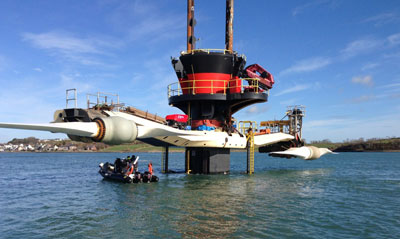
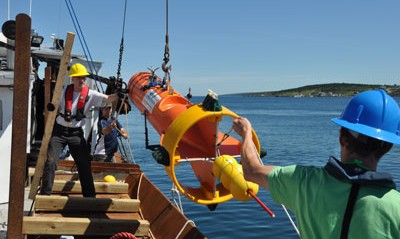
Rockland Scientific has been awarded a contract to deliver a VMP-250 Turbulence Profiler to the University of Bergen, Norway. The VMP-250 system includes a buoyancy collar and remote-controlled weight release mechanism, allowing the profiler to be operated in an uprising configuration.
University of Bergen researcher Dr. Ilker Fer, will deploy the VMP-250 during the Arctic summer 2014 to measure turbulence and mixing under drifting sea ice, as part of the project “On Thin Ice: Role of Ocean Heat Flux in Sea Ice Melt” funded by the Research Council of Norway. The objective of the project is to study the effect of vertical mixing on the heat budget and ice cover of the Arctic Ocean. For more information on the project, see Ilker Fer’s website.
A video showing the deployment cycle of the VMP-250 Upriser is available on Rockland’s YouTube channel:
Rockland Scientific International Inc.
520 Dupplin Road
Victoria, BC V8Z 1C1
Canada
Email: General Inquiries
Email: Technical Support
Twitter: @RSI_Turbulence
